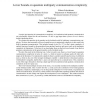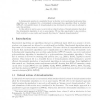215 search results - page 7 / 43 » Quantum computers that can be simulated classically in polyn... |
TCC
2004
Springer
14 years 1 months ago
2004
Springer
Quantum 2-party cryptography differs from its classical counterpart in at least one important way: Given blak-box access to a perfect commitment scheme there exists a secure 1−2...
STOC
2010
ACM
14 years 5 months ago
2010
ACM
The relationship between BQP and PH has been an open problem since the earliest days of quantum computing. We present evidence that quantum computers can solve problems outside th...
COCO
2009
Springer
14 years 2 months ago
2009
Springer
A major open question in communication complexity is if randomized and quantum communication are polynomially related for all total functions. So far, no gap larger than a power o...
SIGACT
2010
13 years 6 months ago
2010
A fundamental question in complexity theory is whether every randomized polynomial time algorithm can be simulated by a deterministic polynomial time algorithm (that is, whether B...
FOCS
2007
IEEE
14 years 2 months ago
2007
IEEE
: We study the computational strength of quantum particles (each of finite dimensionality) arranged on a line. First, we prove that it is possible to perform universal adiabatic q...


